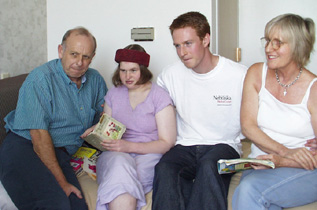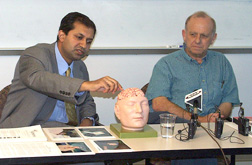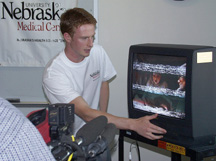 |
The Kendall family traveled to Omaha for a rare surgical procedure to help Katherine, second from left. Katherine is flanked by her father, Nigel, brother, Oliver, and mother, Anna. |
All Americans will swallow hard and reflect next week on the first anniversary of Sept. 11. However, for a British family staying at the Lied Transplant Center, Sept. 11 will have an extra special meaning.
“It’s quite symbolic,” said Nigel Kendall, father of Katherine Kendall, an 18-year-old girl who is in Omaha to undergo a rare brain surgery procedure at UNMC/NHS to relieve her ongoing epileptic seizures. “Katherine’s surgery will be finished on Sept. 11.”
A new beginning
The Kendalls are hoping that Sept. 11 will mark the beginning of a better life for their family. For the past 13 years, the Kendalls have watched Katherine’s health deteriorate, as her epilepsy caused severe neurological and developmental problems. Prior to the onset of epilepsy, Katherine had survived acute lymphoblastic leukemia when she was 1.
“For six years, I have been researching epilepsy,” said Anna Kendall, Katherine’s mother. “I would get up at 4 a.m. and research for about four hours, then at the end of the day, I would put in another four hours. We have 2,000 medical papers on epilepsy in our house.”
The result of all this research led them to Omaha and UNMC/NHS neurosurgeon Arun-Angelo Patil, M.D. Charles Polkey, M.D., a leading British neurosurgeon at King’s College in London, told the Kendalls about Dr. Patil.
“He told us that there’s only one surgeon in the world that can help Katherine, and he’s in the United States in Omaha, Nebraska,” said Nigel Kendall at a news conference Monday afternoon in the Lied Transplant Center.
 |
Vik Prabhu, M.D., a UNMC neurosurgeon, left, and Katherine’s father, Nigel Kendall, discuss the surgery at Monday’s news conference. |
The road to Omaha
Getting to Omaha posed a whole new challenge for the Kendalls. They needed to raise more than $200,000, so they turned to the public for help. Through a variety of fund-raising events and by mortgaging the home of Katherine’s grandmother, they were able to reach their goal.
The procedure Dr. Patil will perform on Katherine is called a multiple subpial transection (MST). It involves disconnecting specific circuits in the brain that create the seizures.
It is a difficult procedure, which actually involves three separate surgeries. Today (Sept. 4), Dr. Patil will place a grid on the areas of the brain on which he will be operating. He will then perform subsequent surgeries on Sept. 6 and Sept. 11, disconnecting the faulty brain circuits on each side of Katherine’s brain.
Dr. Patil is one of the only neurosurgeons in the world who performs the procedure on both sides of the brain. Each procedure can take up to 12 hours.
“He (Dr. Patil) deserves a lot of credit because he persevered with this procedure that gives families hope,” said Vik Prabhu, M.D., a UNMC neurosurgeon who spoke at the news conference. “It’s a brilliant surgery. It takes a lot of intelligent thinking.”
 |
Oliver Kendall talks about his sister Katherine. |
Daily challenges
For the Kendalls, every day is a challenge with Katherine, who has about six falls daily due to the seizures. She wears a protective headgear at all times to reduce her risk of serious injury.
“(In her present state) Katherine has no dignity,” Nigel Kendall said. “She’s incontinent and can’t go to the bathroom by herself. Yet, any bathroom is a dangerous area (because she can fall). Twenty percent of people with Katherine’s epilepsy die due to falls.”
Last week, Nigel Kendall injured his back while trying to contain Katherine during a serious seizure. Anna Kendall said, “We’re all in danger. She throws me down the stairs a couple times a week (when she tries to contain Katherine during her seizures).”
A glimpse into the future
Even if successful, the surgery cannot reverse the neurological and developmental damage that Katherine has sustained. Rather, the best the Kendalls can hope for is an end to the constant seizures and the risk of a serious fall.
“Every now and then, when she’s laughing and smiling, we get a glimpse (of the potential Katherine has),” said Oliver Kendall, Katherine’s 22-year-old brother. “That’s what we want to get her back to.”
For more information
For more information on the Kendall family, go to their Web site at www.katherineappeal.com.